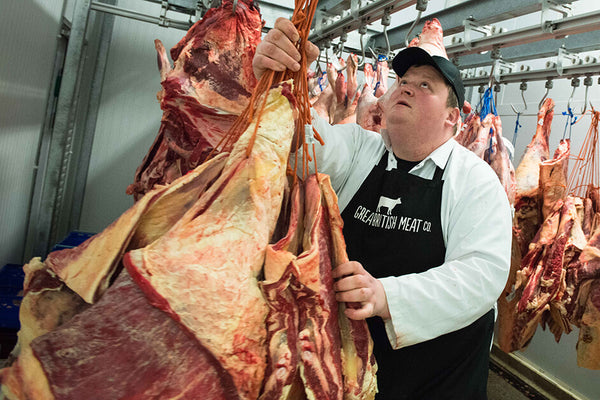Hanging meat is really important to the quality of meat, and is the first stage of good butchery. So what is hanging and why is it important for meat?

Hanging is the process of aging or maturing meat by hanging the carcass (or part of it) from a hook. It is usually done in a temperature controlled room, with good air flow. At the butchery we have a walk-in aging room, which is basically a big fridge with a massive fan.
During hanging, the enzymes in the meat make the fibres of the muscles softer and more elastic, which ultimately leads to the meat becoming relaxed and tender. In reality the aging process is also the start of decomposition, but it is absolutely nothing to worry about, as when kept in the right conditions and temperature by the butcher, actual decay that will taint the meat will not happen for weeks, or even months.
Meat also loses moisture as it hangs, which is a good thing when it comes to cooking. Young meat, that is wet and underhung carries too much water in it, which ends up either in your pan or tray during cooking or on your carving board when you cut it. Basically the moisture expands during cooking and leaches out through the stretched fibres of the meat. Oddly this means that ‘wet meat’ actually ends up drier after cooking. Nicely hung-meat is tastier and more tender than unhung meat, it is that simple.
Not all meat hangs the same way, and there are some limits that a butcher needs to observe. Almost all meat will benefit from a few days hanging in a fridge to relax and settle the muscles, and allow the fat to solidify (as it’s pretty much liquid in a live animal). Meats without marbling or good fat covering, do not stand up to lengthy hanging times, as they are not protected from deterioration by the fat. Pork, veal and young lamb fall into this category, but we still give them four to six days hanging to allow flavours to develop safely.
It’s also worth adding that if you intend to freeze meat, you really should get some aged meat. Once again water and moisture are the reason, as the expansion of water in wet meat expands as it freezes meaning ice crystals will tear and push apart the fibres of the meat. Meat that has been properly hung will have less moisture, and will contain more elastic fibres that are better suited to cope with expanding ice crystals. This will mean when you defrost the meat and then cook it, less water will leach out compared to wet meat.
Easily the biggest reason for buying meat from a butcher compared to a big retailer or supermarket, is that the meat is unlikely to be hung properly. Even putting welfare and provenance aside, a supermarket doesn’t hang meat as it leads to weight loss which in turn leads to money (quite literally) going down the drain. A side of beef will looses 15-20% through ‘drip loss’ during the ageing process, and weight is money for the big retailers. There are lots of horror stories of mis-practise where abattoirs are told to hose carcasses regularly to retain moisture and weight.
So there you have it. Hanging meat is the first, and probably the most important stage of good butchery. It is really important to the quality of meat, and is possibly the main reason to buy from a butcher. We hope you’ve learned something new reading this, and it has made you think about where your food comes from.
Drop us a line to hello@greatbritishmeat.com if you’ve got any other questions about how we age or anything else.










































![Air gun 101: The differences between .177 & .22 – Which jobs they do best ? [Infographic]](https://airgunmaniac.com/wp-content/uploads/2020/09/g44-150x150.jpg)
